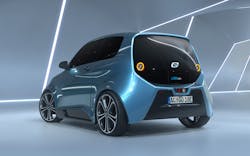Tesla’s Latest Rival Looks a Lot Like Its German Alter Ego
Tesla Inc.’s latest German rival is a fast-moving startup with global ambitions, no combustion-car baggage and a lofty valuation. And its hard-charging founder aims to challenge Elon Musk’s company with a bargain electric car for the masses.
Set up by an engineering professor with a track record of successfully developing and selling electric vehicles, e.GO Mobile AG is ramping up production of a battery-powered compact that will cost about half as much as the Tesla Model 3. But unlike the California pioneer, the German manufacturer expects to generate cash out of the gate.
“I’ve needed Tesla as a role model,” Guenther Schuh, e.GO’s founder and the mastermind behind Europe’s best-selling electric van, said inside his factory built on the site a former television-tube plant in Aachen, near the French border. “For so long, no startup or individual entered this shark tank alone, so it was great to get a demonstration of how that might work.”
Initial funding for e.Go came from Schuh’s sale of StreetScooter, a no-frills electric van, to Deutsche Post AG in 2014. Germany’s mail carrier was looking for an affordable electric vehicle for urban deliveries, and Schuh — the chair of production engineering at RWTH Aachen University, one of Germany’s top technical schools — developed a bare-bones model with no air conditioning or radio and a top speed of less than 50 miles per hour. The model was a surprise hit, and Deutsche Post has doubled StreetScooter capacity to 20,000 a year and is considering listing the unit.
In addition to StreetScooter proceeds, German auto supplier ZF Friedrichshafen AG invested 135 million euros (US$154 million) in e.GO as part of a project to jointly develop a self-driving minibus. The startup has now enlisted HSBC Holdings Plc to raise as much as 300 million euros for its plans to expand to four models — a deal that could lift its value above $1 billion, making it a rare German “unicorn.”
While Tesla is focusing on upscale buyers and offering sports car-like performance, e.GO is taking a utilitarian tack. Its first model, the Life, is a simple urban runabout that looks like a boxy version of the Fiat 500. The four-seater boasts a cheap price for an electric car, but not much else. So far, e.GO has 3,200 pre-orders and isn’t taking more. Deliveries will begin in April, and the plan is to produce 100,000 vehicles annually by 2022 — on par with Tesla’s output last year.
“It’s going to be tough’’ for e.GO to compete with entry-level conventional cars unless pollution-related driving restrictions force thrifty buyers to switch to electrics, said Wolfgang Bernhart, a partner at Roland Berger Strategy Consultants in Munich. “In time, there’ll also be competition from used electric cars.”
Regulatory support may be on the way after the European Union mandated an additional 37.5% reduction in carbon-dioxide emissions from cars by 2030. The new limit comes on top of tighter 2021 restrictions, and the decision prompted Volkswagen AG to say it’ll need to overhaul a 30-billion-euro investment plan to prepare for battery vehicles accounting for more than 40% of European deliveries.
The transition to the electric-car era has increasingly strained traditional carmakers, prompting partnerships that would have been unthinkable a few years ago. BMW AG and Mercedes-Benz parent Daimler AG are in talks to join forces on batteries, vehicle platforms and autonomous-driving technology to stem rising expenses, according to people familiar with the matter.
The no-nonsense specifications of the Life stem from e.GO’s response to offsetting high battery costs and steeper procurement prices than larger rivals. The German manufacturer uses as many off-the-shelf parts as possible — including the drive train, which comes from Robert Bosch GmbH, and rear lights that were initially developed for trucks. That saves time and money. Schuh expects the company to generate positive cash flow already next year and be profitable in 2021, in stark contrast to Tesla’s cash-burn issues.
The e.GO Werk 1 plant spans some 16,000 square meters — more than the size of two soccer fields — and cost 26 million euros to build, a fraction of the price tag of an ordinary auto factory.
During a visit last month, employees gathered around a vehicle chassis sitting on an autonomous platform, gradually moving down a production line spanning one length of the building. Testing booths were located on the other side, with plenty of space in between for more capacity.
The facility — located on an industrial estate near Aachen’s city center — was strewn with computer screens and bins of components in preparation for series production starting in March, five months later than planned. To head off Musk’s “production hell” on the Model 3, Schuh is using the unexpected delays caused by supplier tests to fine-tune assembly. For instance, he tweaked a hoisting platform to eliminate the risk of it crushing cars.
Expansion beyond Aachen is already in the works, with discussions underway to set up assembly joint ventures in China and Mexico and make battery cells in Germany. Schuh is also in talks with Chinese cities to collaborate on areas for autonomous vehicles, like its 15-person Mover minibus.
Despite the grand ambitions, e.GO’s success ultimately depends on making money on an electric car cheap enough to offset the drawbacks of limited driving ranges and long charging times (as much as 9.8 hours for the Life). Schuh is aware that he’s entering uncharted waters.
“I don’t know any carmaker that makes money in this vehicle category,” the lanky, bespectacled professor said. “Especially not if they’re electric.”
By Elisabeth Behrmann
About the Author
Bloomberg
Licensed content from Bloomberg, copyright 2016.
